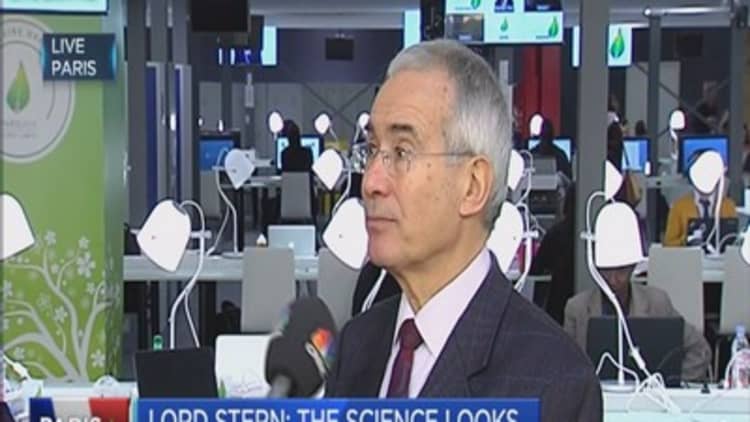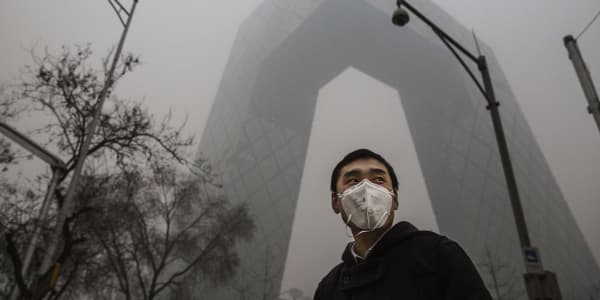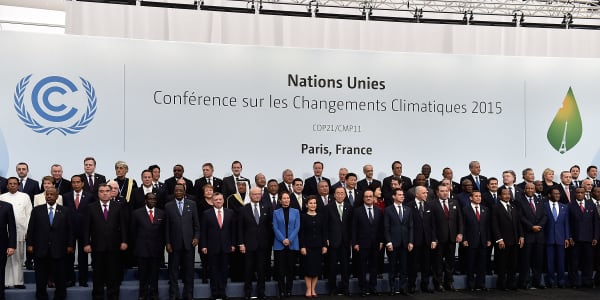
The United Nations Climate Summit in Paris has now run into overtime with officials stating that a final text would only be put up for review on Saturday.
The event, known as COP21, has seen the world's leaders, scientists, pressure groups and UN agencies attempt to thrash out a new international agreement on the climate with the aim of keeping global warming below 2 degrees Celsius.
Here, CNBC takes a look at some of the hurdles that still remain, and whether a deal is in the offing.
It ain't over til it's over

Speaking to CNBC Nicholas Stern, chair of the Grantham Research Institute on Climate Change and the Environment, said that there was a "great mood" to resolve remaining issues.
"If you measure in terms of brackets in (the) text – brackets is unagreed text – I think in the two days that we had up to last night when the latest version came down, we went from 350 brackets down to about 50," he said. "So we're moving towards agreement here."
"There is a difference of course between what developed countries do and what developing countries do and there are discussions still, not quite finalized, on flows of finance, and those are important too," he added.
According to Reuters, delegates said there was a split in relation to who should pay for developing nations to transition to low carbon economies, as well as money to mitigate the impact of global warming across the planet.
Going into the last 24 to 36 hours, Stern said that, overall, he thought parties were close to an agreement.
"As (Baseball legend) Yogi Berra has said, 'it ain't over til it's over' but we have to be very optimistic but (also) very careful, because in a state of affairs where you look for consensus, you do get last minute hold outs."
Stern added that the text being worked on was "really quite strong" and "charting a course."
"It's saying the transition to (a) low carbon economy is where we're going, it's very attractive, it's the growth story," he added.
Risk taking
As delegates enter the final stretches of what has been an intense two weeks, the remaining sticking points center on what Achim Steiner, executive director of the United Nations Environment Program, said were "fundamental principles."
"Differentiation, for example: developed and developing economies need to figure out a way in which they can retain the principle of differentiation, but no longer in the sense of one group does something, the other one doesn't," he said.
According to delegates, the Chinese were opposing calls for countries to assess and update national plans for curbing greenhouse gas emissions every five years, Reuters reported.
Saudi Arabia is also resisting the inclusion of language in the draft that calls for a rise in global temperatures to be restricted to "well below" two degrees Celsius above pre-industrial levels, according to Reuters. The Saudis fear this could negatively impact oil production.
Steiner also raised the issue of how much "risk" parties were willing to take.
"Are we going to signal here in Paris that the world should actually aim for 1.5 degrees (Celsius) as the maximum threshold for global warming, or stick to what it had agreed in Copenhagen, 2 degrees," he said.
"Now, these are not issues over which to risk the entire agreement, but in the dynamic of negotiations we will have to watch very carefully."
Hope
On Thursday, the European Union's Commissioner for Climate Action and Energy told CNBC that "the challenge" facing delegates was so important "that if we need additional time it shouldn't be a problem."
"The important thing is to get out of Paris with a powerful instrument fit for purpose, and the purpose is to limit global warming below two degrees, far below 2 degrees (Celsius)," Miguel Arias Cañete added.
--Reuters contributed to this report






